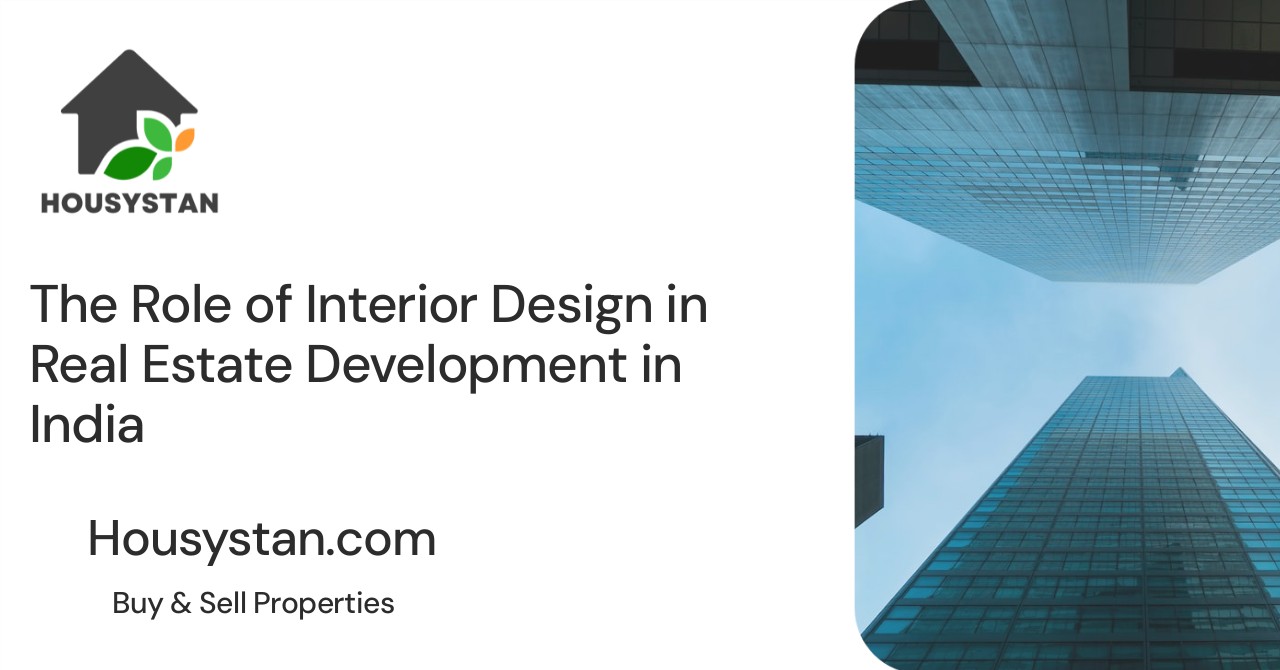The Role of Interior Design in Real Estate Development in India
Read latest blogs and articles from Housystan

The Information mentioned here was last updated on:
29/1/2026The Role of Interior Design in Real Estate Development in India
India's real estate market has been experiencing rapid growth in recent years, with burgeoning cities and an increasing demand for residential and commercial spaces. As this trend continues, interior design is becoming an essential aspect of real estate development, playing a vital role in influencing buyer decisions and enhancing property values. This blog explores how interior design is intricately woven into the fabric of real estate development in India, outlining the key ways in which it makes an impact.
Understanding the Importance of Interior Design in Real Estate
- Verified Tenants/Buyers
- Unlimited Property Listing
- Zero subscription/charges fee
Interior design is no longer an afterthought in property development but a crucial component that developers consider from the outset. Here’s why:
- First Impressions Matter: Potential buyers often form their first impressions within seconds of entering a property. A well-designed interior can captivate interest and create a memorable experience, increasing the likelihood of a sale.
- Reflecting Lifestyle Trends: Modern Indian buyers are increasingly seeking homes and workplaces that reflect their lifestyles. Interior design caters to these preferences by incorporating contemporary design trends, thereby making properties more appealing.
- Functional and Aesthetic Balance: Beyond aesthetics, interior design ensures spaces are functional, meeting the practical needs of occupants. Well-designed interiors seamlessly blend form and function to enhance comfort and usability.
Key Elements of Interior Design in Real Estate
To understand how interior design influences real estate, let's delve into the key elements that are prioritized during the development process:
1. Space Planning
- Maximizes usable space for efficient layouts.
- Improves flow and accessibility within the property.
- Enhances natural light and ventilation, creating a pleasant environment.
2. Color and Texture
- Strategic use of colors to set moods and define spaces.
- Textures add depth and interest, influencing perceptions of luxury and coziness.
3. Lighting Design
- Appropriate lighting can transform a space, adding drama or creating a soothing ambiance.
- Energy-efficient lighting solutions are increasingly popular for sustainability.
4. Materials and Finishes
- Selection of durable, sustainable materials to ensure longevity.
- Finishes are chosen not only for looks but also for maintenance ease and adherence to environmental standards.
5. Furniture and Fixtures
- Streamlined designs that blend with the overall architecture.
- Customizable pieces providing flexibility to suit different styles and preferences.
The Economic Impact of Interior Design on Real Estate
Interior design significantly affects property values and developer revenues. Here's how:
- Increased Property Value: Thoughtful interior design can lead to higher appraisals, as aesthetically pleasing spaces often command more money per square foot.
- Faster Sales Cycles: Properties with appealing interiors are likely to sell faster, reducing holding costs for developers and investors.
- Higher Rental Yields: Well-designed rental properties attract quality tenants who are willing to pay a premium for better living environments.
- Reduced Vacancy Rates: Commercial spaces that are aesthetically and functionally superior tend to have lower vacancy rates, benefiting commercial property owners and developers.
Interior Design Trends Influencing Indian Real Estate
Emerging trends in interior design are shaping the real estate landscape in India, reflecting broader societal shifts:
- Sustainable Designs: With growing environmental consciousness, developers are incorporating sustainable practices, using eco-friendly materials, and maximizing energy efficiency.
- Smart Homes and Offices: The integration of technology into everyday living spaces is gaining traction. Smart features that enhance convenience and safety are becoming essential.
- Minimalist Aesthetics: A shift towards minimalism in interior design is evident, driven by the need for clutter-free and functional living spaces that emphasize simplicity and elegance.
- Biophilic Design: Introducing elements of nature into interiors, such as indoor plants and nature-inspired decor, is resonating well with buyers seeking tranquility and wellness.
The Role of Interior Designers in Real Estate Development
Interior designers play a pivotal role as part of a real estate development team, offering expertise that bridges the gap between architectural intent and user experience. Their responsibilities include:
- Collaborating with Architects and Developers: Ensuring that interior spaces align with the architectural vision and meet market demands.
- Customizing Spaces for Target Markets: Identifying and catering to the unique preferences of specific buyer demographics.
- Staying Ahead of Trends: Keeping abreast of global design trends to offer innovative solutions that give properties a competitive edge.
- Enhancing Branding and Identity: Helping developers establish a cohesive branding strategy through design elements that reflect their values and objectives.
Challenges and Opportunities
While interior design offers numerous benefits, it also poses certain challenges for real estate developers in India:
- Budget Constraints: Balancing quality design with cost considerations remains a significant challenge, especially for large-scale projects.
- Regulatory Compliance: Adhering to building codes and environmental regulations can complicate design processes and add to costs.
- Rapid Urbanization Pressures: The need to swiftly develop housing to meet urban demand can lead to compromises on design quality.
- Technology Integration: Keeping up with the fast pace of advancements in technology and integrating them into design is both a challenge and an opportunity.
Nonetheless, these challenges also present opportunities for innovative problem-solving. By embracing creativity, sustainable practices, and cutting-edge technology, developers and designers can collaborate to push the boundaries of what is possible in interior design.
Conclusion: Interior Design as a Catalyst for Growth
In the dynamic landscape of Indian real estate, interior design stands out as a catalyst for growth and differentiation. It not only enhances the aesthetic and functional appeal of properties but also boosts their market value and desirability. As developers and designers continue to recognize the significant impact of interior design, its role in shaping the future of real estate development in India is set to grow even more profound.